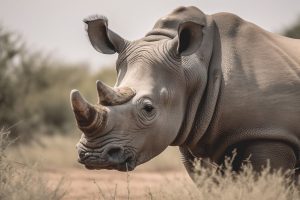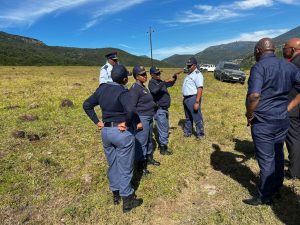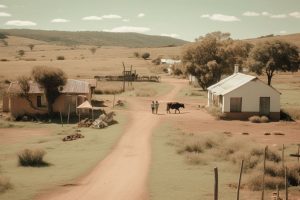Major General Nolitha Tito is the new Deputy Provincial Commissioner of Support Services in Eastern Cape Province. Her appointment is expected to bring positive change to the province’s leadership. Major General Tito has over twenty years of experience in public administration and strategic leadership roles, with a strong focus on human resource management. Her appointment is highly anticipated and welcomed by the wider community.
Rhino poaching continues to be a critical issue in South Africa, with the country being home to more than 80% of the world’s remaining rhino population. The illegal trade in rhino horns, fueled by demand in Asian countries where it is believed to have medicinal properties, has continued to thrive, despite efforts to curb it.
Police Minister General Bheki Cele and Deputy Minister Cassel Mathale will pay their respects to Sergeant Lwando Lawrence Bunga and Sergeant Mario Nel, two fallen heroes who were tragically shot while on duty in the Eastern Cape’s Nelson Mandela Metro and Buffalo City Metro respectively.
In recent years, South African schools have been plagued by a worrying trend of teachers engaging in assault and corporal punishment. The Eastern Cape province, in particular, has seen six teachers from different schools facing investigations for such offenses. Last year, three teachers were dismissed for similar misconduct, and another resigned earlier this year. The issue came to light again after an incident at Huku Senior Secondary School in Mandileni village, where three grade 12 students accused their principal of beating them.
The Msikaba Bridge project experienced a somber atmosphere as the Minister of Transport, Sindisiwe Chikunga, expressed her deep sorrow regarding the recent fatal accident at the construction site. The accident occurred on May 5th at 11:00 am, at the South Main Batch Plant in Lusikisiki, Eastern Cape, resulting in the loss of a worker who was committed to ensuring the project’s successful completion.
The recent arrest of two suspects linked to the spate of attacks on Intercape buses in the Eastern Cape province is a step towards curbing the problem. However, more needs to be done as over 160 incidents of attacks on Intercape buses have been reported in the area causing great inconvenience and fear for passengers and bus drivers alike.
The recent deaths of two South African Police Service (SAPS) members in Eastern Cape have sent shockwaves throughout the country. The incidents highlight the dangers that police officers face in the line of duty in South Africa. ## First Incident
The N2 Wild Coast Road Project is a significant infrastructure project that has the potential to revolutionize South Africa’s transport industry. The South African National Roads Agency SOC Limited (SANRAL) is responsible for the project, estimated to cost R10 billion.
The situation in Majola villages of Port St Johns in the Eastern Cape has been dire for years. The village has experienced incidents of violence and crime that have resulted in the burning down of over 140 homesteads and houses and the killing of 22 people in the past three years alone. The conflict has displaced scores of families, leaving women and children destitute.
The possibility of Russian President Vladimir Putin’s visit to South Africa in August has sparked concerns and debates among the citizens. The International Criminal Court is after Putin for his alleged involvement in starting the war in Ukraine, which has led to suggestions on how to host him without violating legal regulations.
The proliferation of illegal firearms in South Africa has contributed to the country’s alarming rate of gunrelated crimes. To address this issue, the South African government has enacted the Firearms Control Act (FCA), which regulates firearms possession, use, and transfer.
Access to nature is not a luxury but a necessity for physical, psychological, and spiritual wellbeing. Numerous studies in many countries have documented the benefits of being in nature. However, more research needs to be done in developing countries on the importance of nature experience. In these countries, nature is often considered a luxury once basic needs are met. Instead, the focus is on economic development, housing and sanitation, and access to green space. As urbanization accelerates in developing countries, nature experience is becoming increasingly rare, and access to nature and green spaces is highly skewed along socioeconomic lines.












